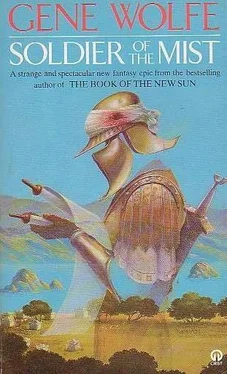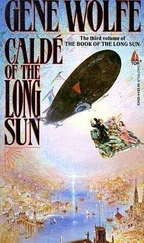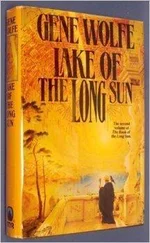Gene Wolfe - Soldier of the mist
Здесь есть возможность читать онлайн «Gene Wolfe - Soldier of the mist» весь текст электронной книги совершенно бесплатно (целиком полную версию без сокращений). В некоторых случаях можно слушать аудио, скачать через торрент в формате fb2 и присутствует краткое содержание. Жанр: Фэнтези, на английском языке. Описание произведения, (предисловие) а так же отзывы посетителей доступны на портале библиотеки ЛибКат.
- Название:Soldier of the mist
- Автор:
- Жанр:
- Год:неизвестен
- ISBN:нет данных
- Рейтинг книги:3 / 5. Голосов: 1
-
Избранное:Добавить в избранное
- Отзывы:
-
Ваша оценка:
- 60
- 1
- 2
- 3
- 4
- 5
Soldier of the mist: краткое содержание, описание и аннотация
Предлагаем к чтению аннотацию, описание, краткое содержание или предисловие (зависит от того, что написал сам автор книги «Soldier of the mist»). Если вы не нашли необходимую информацию о книге — напишите в комментариях, мы постараемся отыскать её.
Soldier of the mist — читать онлайн бесплатно полную книгу (весь текст) целиком
Ниже представлен текст книги, разбитый по страницам. Система сохранения места последней прочитанной страницы, позволяет с удобством читать онлайн бесплатно книгу «Soldier of the mist», без необходимости каждый раз заново искать на чём Вы остановились. Поставьте закладку, и сможете в любой момент перейти на страницу, на которой закончили чтение.
Интервал:
Закладка:
Gene Wolfe
Soldier of the mist
This book is dedicated-with the greatest respect and affection to Herodotos of Halicarnassos
First there was a struggle at the barricade of shields; then, the barricade down, a bitter and protracted fight, hand to hand, at the temple of Demeter…
- HerodotosAlthough this book is fiction, it is based on actual events of 479 B.C.
FOREWORD
About two years ago, an urn containing scrolls of papyrus, all apparently unused, was found behind a collection-of Roman lyres in the basement of the British Museum. The museum retained the urn and disposed of the scrolls, which were listed in Sotheby's catalogue as Lot 183. Various blank papyrus rolls, possibly the stock of an Egyptian stationer.
After passing through several hands, they became the property of Mr. D , a dealer and collector in Detroit. He got the notion that something might be concealed in the sticks on which the papyrus was wound and had them X-rayed. The X-rays showed them to be solid; but they also showed line after line of minute characters on the sheet (technically the protokollon) gummed to each stick. Sensing himself on the verge of a discovery of real bibliotic importance, he examined a scroll under a powerful lens and found that all its sheets were covered on both sides with minute gray writing, which the personnel of the museum, and of Sotheby's, had apparently taken for dust smears. Spectrographic analysis has established that the writing instrument was a sharp "pencil" of metallic lead. Knowing my interest in dead languages, the owner has asked me to provide this translation.
With the exception of a short section in passable Greek, this first scroll is written in archaic Latin, without punctuation. The author, who called himself "Latro" (a word that may mean brigand, guerrilla, hired man, bodyguard, or pawn), had a disastrous penchant for abbreviation-indeed, it is rare to find him giving any but the shortest words in full; there is a distinct possibility that some abbreviations have been misread. The reader should keep in mind that all punctuation is mine; I have added details merely implied in the text in some instances and have given in full some conversations given in summary.
For convenience in reading, I have divided the work into chapters, breaking the text (insofar as possible) at the points at which "Latro" ceased to write. I have employed the first few words of each chapter as its title.
In dealing with place names, I have followed the original writer, who sometimes wrote them as he heard them but more often translated them when he understood (or believed he understood) their meanings. "Tower Hill" is probably Corinth; "the Long Coast" is surely Attica. In some cases, Latro was certainly mistaken. He seems to have heard some taciturn person referred to as having Laconic manners (Greek??????????) and to have concluded that Laconia meant "the Silent Country." His error in deriving the name of the principal city of that region from a word for rope or cord (Greek????????) was one made by many uneducated speakers of his time. He appears to have had some knowledge of Semitic languages and to have spoken Greek fairly fluently, but to have read it poorly or not at all.
A few words about the culture in which Latro found himself soon after he began to write may be in order. The people no more called themselves Greeks than do the people of the nation we call Greece today. By our standards they were casual about clothes, though in most cities it was considered improper for a woman to appear in public completely naked, as men often did. Breakfast was not eaten; Unless he had been drinking the night before, the average Greek rose at dawn and ate his first meal at noon; a second meal was eaten in the evening. In peacetime even children drank diluted wine; in wartime soldiers complained bitterly because they had only water, and often fell ill.
Athens ("Thought") was more crime-ridden than New York. Its law against women's leaving their homes alone was meant to prevent attacks on them. (Another woman or even a child was a satisfactory escort.) First-floor rooms were windowless, and burglars were called "wallbreakers." Despite the modern myth, exclusive homosexuality was rare and generally condemned, although bisexuality was common and accepted. The Athenian police were barbarian mercenaries, employed because they were more difficult to corrupt than Greeks. Their skill with the bow was often valuable in apprehending suspects.
Although the Greek city-states were more diverse in law and custom than most scholars are willing to admit, a brisk trade in goods had effected some standardization in money and units of measure. An obol, vulgarly called a spit, bought a light meal. The oarsmen on warships were paid two or three obols a day, but of course they were fed from their ship's stores, six obols made a drachma (a handful), and a drachma bought a day's service from a skilled mercenary (who supplied his own equipment) or a night's service from one of Kalleos's women. A gold stator was worth two silver drachmas. The most widely circulated ten-drachma coin was called an owl, from the image on its reverse. A hundred drachmas made a mina; sixty minas a talent-about fifty-seven pounds of gold or eight hundred pounds of silver.
The talent was also a unit of weight: about fifty-seven pounds. The most commonly used measure of distance was the stade, from which comes our stadium. A stade was about two hundred yards, or a little over one-tenth of a mile.
Humanitarians accepted the institution of slavery, realizing that the alternative was massacre; we who have seen the holocaust of the European Jews should be sparing in our reproaches. Prisoners of war were a principal source of supply. A really first-class slave might cost as much as ten minas, the equivalent of thirty-six thousand dollars. Most were much more reasonable.
If the average well-read American were asked to name five famous Greeks, he would probably answer, "Homer, Socrates, Plato, Aristotle, and Pericles." Critics of Latro's account would do well to recall that Homer had been dead for four hundred years at the time Latro wrote, and that no one had heard of Socrates, Plato, Aristotle, or Pericles. The word philosopher was not yet in use.
In ancient Greece, skeptics were those who thought, not those who scoffed. Modern skeptics should note that Latro reports Greece as it was reported by the Greeks themselves. The runner sent from Athens to ask Spartan help before the battle of Marathon met the god Pan on the road and conscientiously recounted their conversation to the Athenian Assembly when he returned. (The Spartans, who well knew who ruled their land, refused to march before the full of the moon.)
– G.W.
PART I
CHAPTER I-Read This Each Day
I write of what has just occurred. The healer came into this tent at dawn and asked whether I recalled him. When I said I did not, he explained. He gave me this scroll, with this stylus of the slingstone metal, which marks it as though it were wax.
My name is Latro. I must not forget. The healer said I forget very quickly, and that is because of a wound I suffered in a battle. He named it as though it were a man, but I do not remember the name. He said I must learn to write down as much as I can, so I can read it when I have forgotten. Thus he has given me this scroll and this stylus of heavy slingstone metal.
I wrote something for him in the dust first. He seemed pleased I could write, saying most soldiers cannot. He said also that my letters are well formed, though some are of shapes he does not know. I held the lamp, and he showed me his writing. It seemed very strange to me. He is of Riverland.
He asked me my name, but I could not bring it to my lips. He asked if I remembered speaking to him yesterday, and I did not. He has spoken to me several times, he says, but I have always forgotten when he comes again. He said some other soldiers told him my name, "Latro," and he asked if I could remember my home. I could. I told him of our house and the brook that laughs over colored stones. I described Mother and Father to him, just as I see them in my mind, but when he asked their names, I could tell him only "Mother" and "Father." He said he thought these memories very old, perhaps from twenty years past or more. He asked who taught me to write, but I could not tell him. Then he gave me these things.
Читать дальшеИнтервал:
Закладка:
Похожие книги на «Soldier of the mist»
Представляем Вашему вниманию похожие книги на «Soldier of the mist» списком для выбора. Мы отобрали схожую по названию и смыслу литературу в надежде предоставить читателям больше вариантов отыскать новые, интересные, ещё непрочитанные произведения.
Обсуждение, отзывы о книге «Soldier of the mist» и просто собственные мнения читателей. Оставьте ваши комментарии, напишите, что Вы думаете о произведении, его смысле или главных героях. Укажите что конкретно понравилось, а что нет, и почему Вы так считаете.








